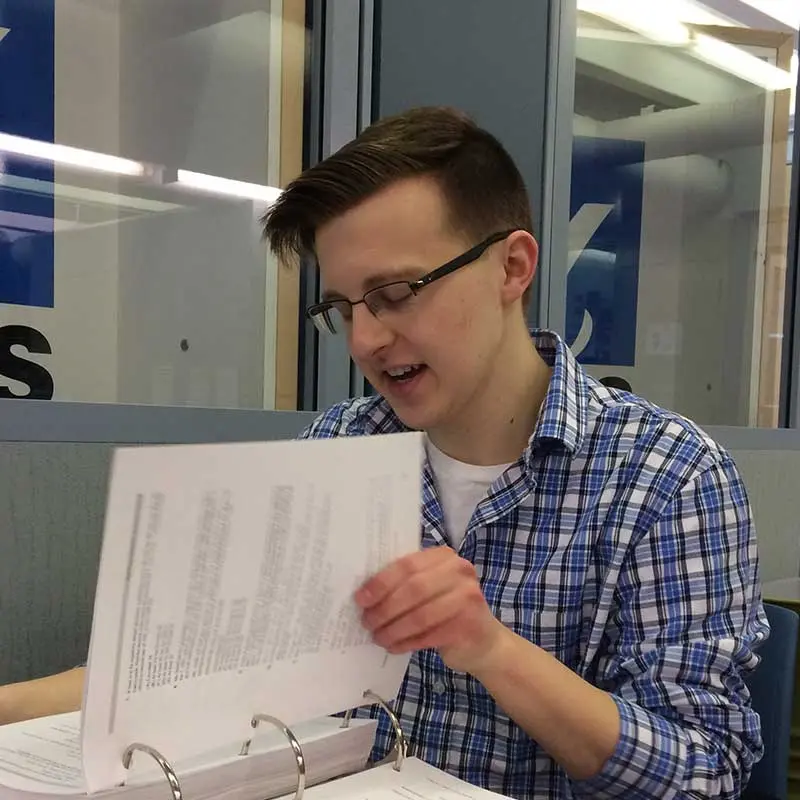For students who entered fall 2022 and beyond.
Freshman Year
Fall Semester
| Course Number | Course Name | Credits |
|---|
ENGL.1010 /
HONR.1100 | College Writing I /
First Year Seminar in Honors: Text in the City (CW) | 3 |
| ECON.2010 | Principles of Microeconomics | 3 |
| FAHS.1090 | First Year Experience Seminar1 | 1 |
| MATH.1230 | Precalculus Mathematics II (MATH)2 | 3 |
| xxxx.xxxx | Social Sciences Perspective (SS) | 3 |
| xxxx.xxxx | Arts and Humanities Perspective (AH) | 3 |
| Total | 16 |
Spring Semester
| Course Number | Course Name | Credits |
|---|
| ENGL.1020 | College Writing II (CW) | 3 |
| ECON.2020 | Principles of Macroeconomics | 3 |
| MATH.1310 | Calculus I (STEM)2 | 3 |
| xxxx.xxxx | Arts and Humanities Perspective (AH) | 3 |
| xxxx.xxxx | Social Sciences Perspective (SS) | 3 |
| Total | 15 |
Sophomore Year
Fall Semester
| Course Number | Course Name | Credits |
|---|
| ECON.3030 | Microeconomic Theory (AIL), (QL)3 | 3 |
| ECON.2110 | Statistics for Business and Economics I | 3 |
| xxxx.xxxx | Social Sciences Perspective (SS) | 3 |
| xxxx.xxxx | Science with Lab Perspective (SCL) | 3 |
| xxxx.xxxx | Free Elective | 3 |
| Total | 15 |
Spring Semester
| Course Number | Course Name | Credits |
|---|
| ECON.3040 | Macroeconomic Theory (CTPS)3 | 3 |
| ECON.2120 | Statistics for Business and Economics II (IL), (WOC)3 | 3 |
| ECON.3/4xxx | Economics Elective | 3 |
| ECON.3/4xxx | Economics Elective | 3 |
| xxxx.xxxx | Free Elective | 3 |
| Total | 15 |
Junior Year
Fall Semester
| Course Number | Course Name | Credits |
|---|
| ECON.3110 | Mathematical Economics | 3 |
| ECON.4200 | Advanced Software for Economics | 3 |
| xxxx.xxxx | Arts and Humanities Perspective (AH) | 3 |
| xxxx.xxx | Free Elective (DCA)3 | 3 |
| xxxx.xxxx | Free Elective | 3 |
| Total | 15 |
Spring Semester
| Course Number | Course Name | Credits |
|---|
| ECON.4070 | Econometrics | 3 |
| ECON.3/4xxx | Economics Elective | 3 |
| xxxx.xxxx | Social Sciences Perspective (SS) | 3 |
| xxxx.xxxx | Free Elective (SRE)3 | 3 |
| xxxx.xxxx | Free Elective | 3 |
| Total | 15 |
Senior Year
Fall Semester
| Course Number | Course Name | Credits |
|---|
| ECON.4300 | Analytical Economics | 3 |
| ECON.3/4xxx | Economics Elective | 3 |
| xxxx.xxxx | Free Elective | 3 |
| xxxx.xxxx | Free Elective | 3 |
| xxxx.xxxx | Free Elective | 3 |
| Total | 15 |
Spring Semester
| Course Number | Course Name | Credits |
|---|
| xxxx.xxxx | Free Elective | 3 |
| xxxx.xxxx | Free Elective | 3 |
| xxxx.xxxx | Free Elective | 3 |
| xxxx.xxxx | Free Elective | 3 |
| xxxx.xxxx | Free Elective | 3 |
| Total | 15 |
Total Minimum Credits = 120.
1Required for entering freshmen in the College of Fine Arts, Humanities and Social Sciences.
2The required sequence of math courses (MATH.1230 and MATH.1310) assumes an ALEKS score between 61 and 75. If the ALEKS score is 76 or above, the student can take MATH.1310 directly. If the ALEKS score is 60 or below the student must first take MATH.1200. The ALEKS exam will be proctored. Students are encouraged to take additional courses such as MATH.1320, MATH.2210, MATH.2340, and COMP.1005
3Core Curriculum Essential Learning Outcomes in the major are met as follows:
- Diversity and Cultural Awareness (DCA) is met by taking ECON.3020 or any other DCA course.
- Information Literacy (IL) is met by taking ECON.2120
- Social Responsibility and Ethics (SRE) is met by taking ECON.3450 or any other SRE course.
- Written and Oral Communication (emphasizing Writing in the Discipline) (WOC) is met by taking ECON.2120
- Critical Thinking and Problem Solving (CTPS) is met by taking ECON.3040
- Applied and Integrative Learning (AIL) is met by taking ECON.3030
- Quantitative Literacy (QL) is met by taking ECON.2010 or ECON.3030.
A major in Quantitative Economics consists of 42-54 economics credits with at least 18 credits at the 3000 level or above. Students transferring to the college and wishing to major in Quantitative Economics must make individual arrangements with the department chairperson regarding satisfaction of major course requirements. Students majoring in Quantitative Economics must maintain at least a 2.200 grade point average (GPA) overall and at least a 2.200 GPA in their economics courses.
No more than two Breadth of Knowledge courses can be taken with the same prefix. The Core Curriculum courses may be taken in any sequence. Refer to the Core Curriculum policy for further details. You should meet with your faculty advisor to determine how you will meet the Core Curriculum requirements.
Current UMass Lowell students should use their Advisement Report in SIS. If you need assistance, please contact your advisor.
Restriction on off-campus study:
Be advised that any course taken at another institution must be formally approved prior to enrollment.
See the catalog policy for details.












